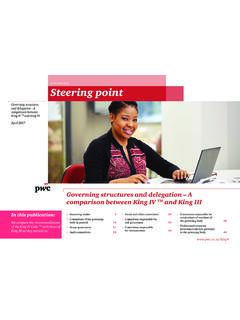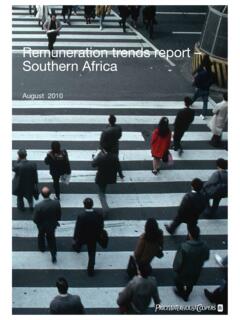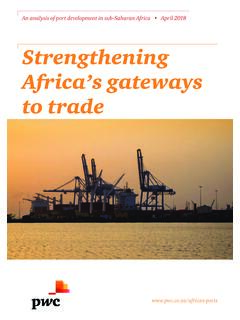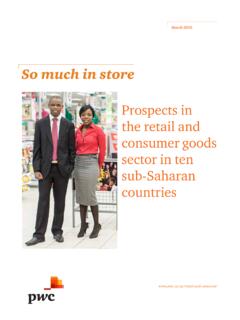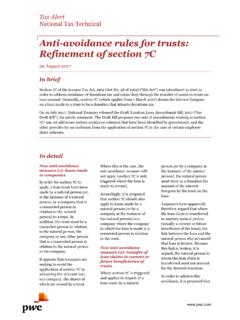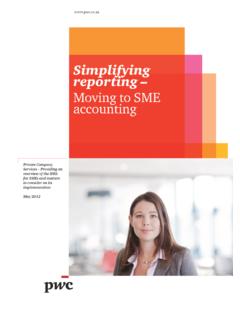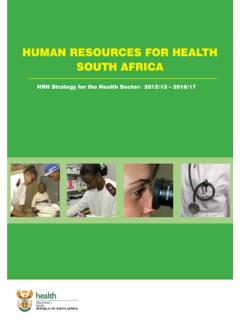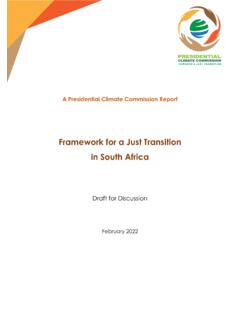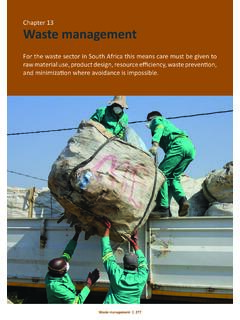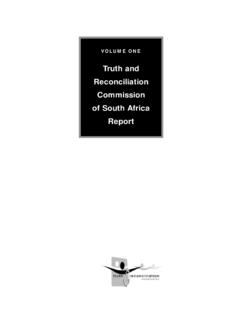Transcription of Government & Public Sector - PwC South Africa
1 Next for Government in South A f rica?C o v i d -19 Government & Public SectorAn opportunity for changeCovid-19 has brought about the destruction of the economy. We must now collectively respond to how we will rebuild and reposition it. President Cyril Ramaphosa, May 2020 ContentsAn opportunity for change 1A crisis at a difficult time 3 The response and its impact 6 The implications for Government are significant 8 Mapping out a new way forward 11 A new focus on the essentials 12 Encourage growth and investment 13 Create a pro-innovation & pro-growth ecosystem 15 A new approach to Public enterprises 17 A more efficient operating model 20 An emphasis on quality of governance 21An opportunity for changeThe Government s operating model is no longer fit for purposeThe COVID-19 pandemic has exposed issues with the Government of South Africa s operating model that were already present before the crisis.
2 South Africa was already on a rocky path, one on which economic growth was declining and inequality was rising. The outcomes of the current model go against the Government s very own goals and ambitions. The key challenges in our country: unemployment and inequality, which have now become considerably more severe through the pandemic, can no longer be approached in the traditional way. An entirely new approach is Government s role from controller to enablerIn its current model, the Government has taken control of key assets and redistributed from pockets of wealth in a divided economy. More and more people are reliant on social grants and transfers without opportunities to participate in the economy and without the financial and sociopsychological benefits of having a job.
3 Meanwhile, state-owned assets have become liabilities for their ultimate owner: the South African Government needs to take on a new role to stay relevant in today s world and to lead the country out of this crisis and onto a better path. Its role of controller and provider is no longer feasible in the modern world and certainly not in the economic reality we now find ourselves in. Instead, the Government can do so much more to become an enabler of growth across the board, encouraging active participation of the majority of its citizens. It can prepare the ground for broad-based business growth and empower its citizens with the tools required to participate in that growth. In this role, the Government would play a central role in setting the direction and the vision for the country, while looking out for the Public good.
4 The management of tasks would be left to those best placed to deliver them be they cities, businesses, civil society organisations or individual citizens. Like a conductor, it would orchestrate action across these stakeholders rather than discordantly trying to play every instrument itself. While many inefficiencies and questionable procurement deals have been exposed, the Government has also shown during the pandemic crisis that it is capable of fast and decisive action. Particularly through partnerships and in cooperation with business, civil society and individual citizens, it has managed to fast-track action and find workable solutions that take a broad range of views and circumstances into consideration. For instance, through a collaborative effort between Volkswagen Group South Africa , the Nelson Mandela Bay Business Chamber, the Nelson Mandela Bay Municipality and the Eastern Cape Department of Health, the car manufacturer s factory in Uitenhage has been made available as a temporary medical facility to accommodate COVID-19 | Where Next for Government in South Africa ?
5 1 The window of opportunity for change is here and nowWhile we face trying times, the current crisis presents an opportunity for South Africa . The crisis highlights the urgency for important change in Government , which may not only help to bring the country out of its deep crisis, but to place it on a stronger development path of more sustainable and more inclusive growth. In this report we first provide some background on where the economy was heading before the COVID-19 pandemic, and where it currently stands. We then present the implications for Government and highlight six key areas we believe should be focused on to achieve an urgently needed and sustainable are resolved not merely to return our economy to where it was before the coronavirus, but to forge a new economy in a new global reality.
6 President Ramaphosa, 21 April 202011 Statement by President Cyril Ramaphosa on introduction of further economic and social measures in response to the COVID-19 epidemic, 21 April 2020, | Where Next for Government in South Africa ? 2A crisis at a difficult timeThe COVID-19 crisis has struck South Africa at a time when its economy is already severely strained South Africa s economy has had a decade of slow growth and started 2020 already in a technical recession. Quarterly growth was in Q3 of 2019, in Q4, and in Q1 of Business confidence, as measured by the Bureau of Economic Research (BER) Business Confidence Index, has been on a downward trend. Unemployment rose to a historical high of over 35% in Q1 of 2020 with unemployment among the youth reaching approximately 50%.
7 3 The major rating agencies have all downgraded South Africa s rating to below investment Statistics South Africa , GDP falls by , Statistics South Africa , Quarterly Labour Market Survey: Q1 2020 , Reuters (March 24, 2020), South Africa s foreign direct investment dips in 2019 , 1: RMB/BER Business Confidence Index, 2005Q1 2020Q20102030405060708090202020192018201 7201620152014201320122011201020092008200 720062005 Note: Score above 50 = positive; below 50 = : Bureau of Economic Research (BER) PwC | Where Next for Government in South Africa ? 3 Figure 2: Unemployment rate, 2008 2020 2025303540202020192018201720162015201420 1320122011201020092008 Unemployment rateIMF predictionSources: Quarterly Labour Force Survey; IMFG overnment finances were already on a deteriorating trajectory The gap between revenue and expenditure was widening and Public debt has been steadily increasing.
8 Budget 2020 suggested little political manoeuvring room to reverse the trend of growing budget deficits. Core Government services of water and electricity provision were increasingly unreliable. More and more state-owned enterprises called for large bailouts following years of mismanagement, further weighing on Public | Where Next for Government in South Africa ? 4 Figure 3: Public debt-to-GDP, 2015 2022406080100202220212020201920182017201 62015 National Treasury prediction February 2020 IMF prediction May 2020 Source: National TreasuryMeanwhile, South Africa s divided economy continues to have among the highest rates of inequality and poverty. While there has been an improvement in welfare and basic services for those below the poverty line,5 inequality has increased over the last According to World Bank estimates, South Africa s consumption expenditure Gini coefficient of (estimated using 2014 data) is higher than the most recent coefficients for any other 5 World bank (2019).
9 Overcoming Poverty and Inequality in South Africa : An Assessment of Drivers, Constraints and Opportunities , Palmer, Ian, Susan Parnell, and Nishendra Moodley (2017). Building a Capable State: Service Delivery in Post-Apartheid South Africa .7 World Bank (2019). Gini index (World Bank estimate): South Africa . The World Bank Development Research Group , | Where Next for Government in South Africa ? 5 The response and its impactA swift response to save lives, but also a costly oneAfter confirming the first COVID-19 cases in South Africa in March, the Government responded swiftly to the outbreak, taking timely and decisive action to contain the transmission of the virus and buy time to build up its healthcare capacity. The Government moved quickly and decisively to implement relief measures, introducing or expanding a number of grants, transfers, and guarantees, while the South African Reserve Bank (SARB) moved rapidly to add liquidity, mitigate cash and credit flow problems and improve market lockdown restrictions, both locally and globally, disrupted supply chains, halted trade and tourism, and restricted businesses and workers, leading to a loss of livelihoods for many and bringing large parts of the economy to a virtual standstill.
10 The SARB forecasts a contraction in GDP this Despite limited fiscal buffers, the Government announced a R500bn fiscal response package to build up the Public health system and provide South African Reserve Bank, Statement of Monetary Policy Committee: Embargo against Delivery: , July 2020, Reuters 2020, South Africa s Ramaphosa pledges COVID-19 rescue package worth 10% of GDP , April 21, of economic growth to pre-lockdown levels is not expected for another 2-5 yearsGDP per capita is expected to decline in the medium term as the population continues to grow while GDP contracts, meaning South Africans will on average become poorer over the next few years. PwC calculations of different scenarios, suggest it could take between two and five years for GDP and employment to return to pre-lockdown levels.
